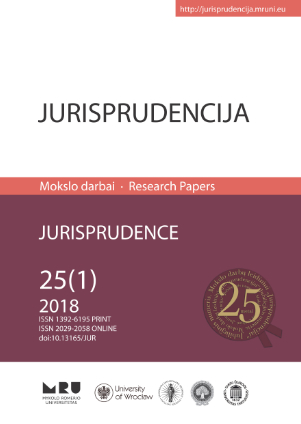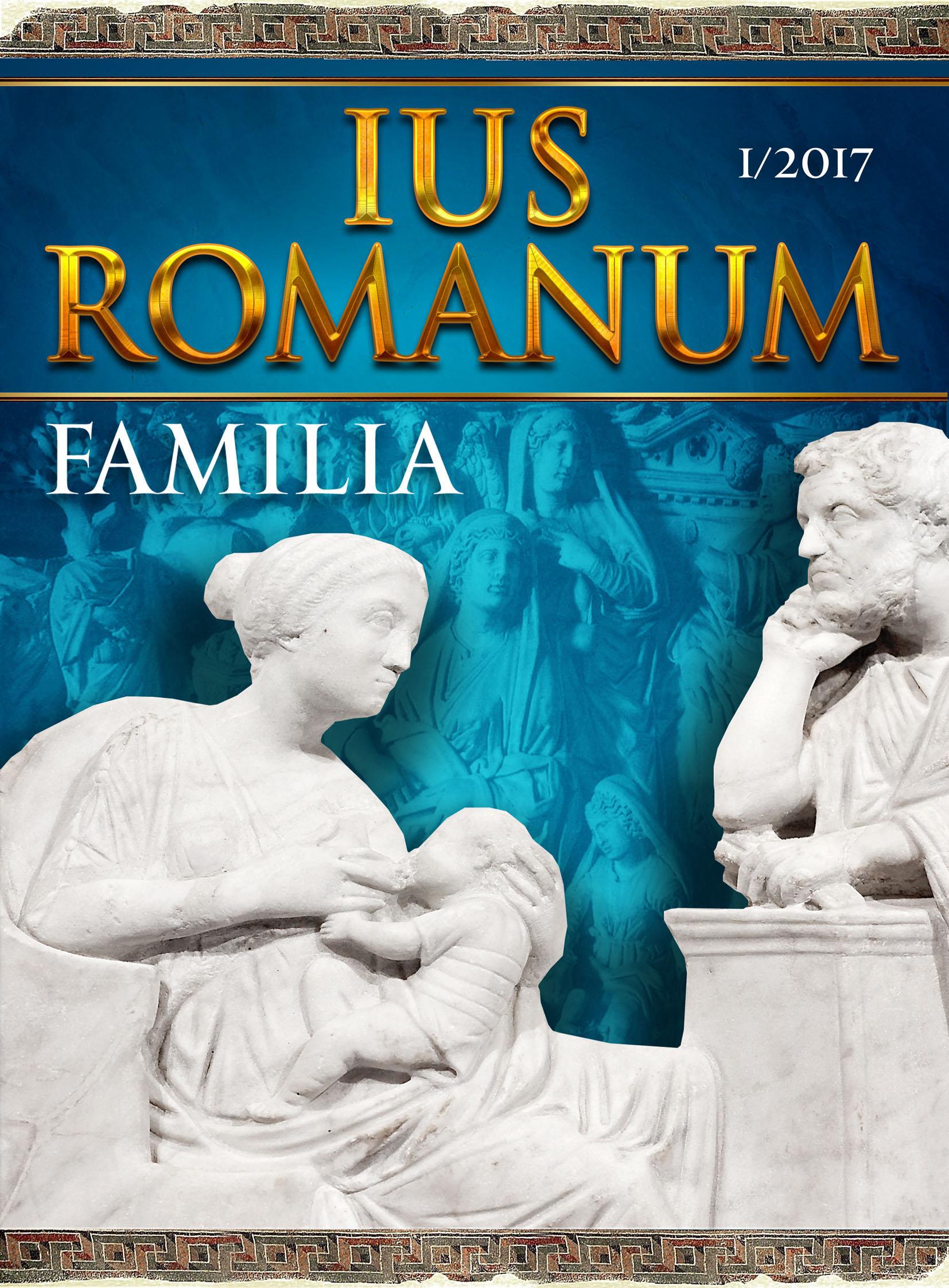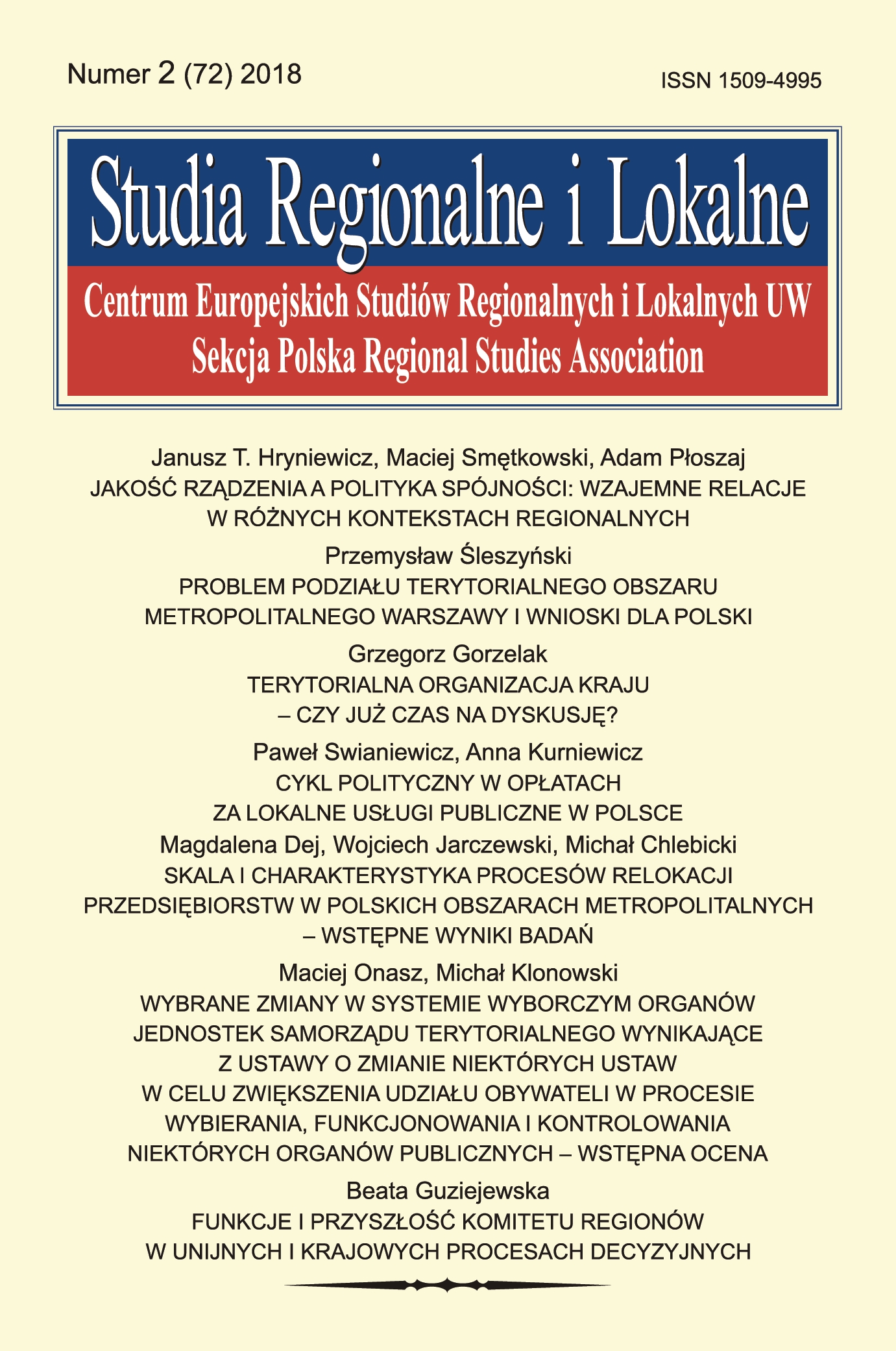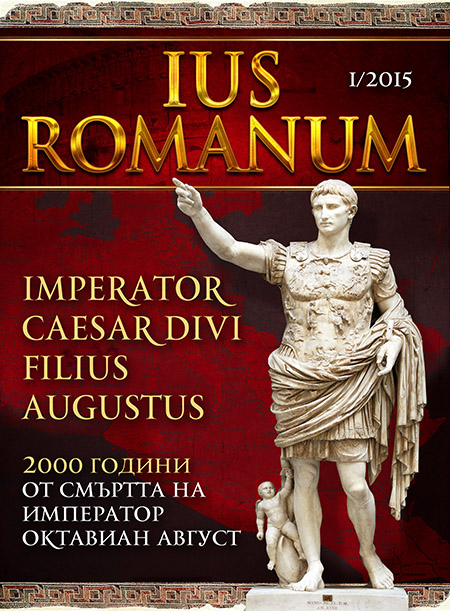Національне законодавство у сфері культури як складова сучасних культуротворчих процесів
In the article explores theoretic aspects national legislation of sphere of culture and art, determination his functions and basis terms.
More...We kindly inform you that, as long as the subject affiliation of our 300.000+ articles is in progress, you might get unsufficient or no results on your third level or second level search. In this case, please broaden your search criteria.
In the article explores theoretic aspects national legislation of sphere of culture and art, determination his functions and basis terms.
More...
The article analyses the legal significance of the application of the concept of the full membership of the Republic of Lithuania in the European Union as a constitutional value in the jurisprudence of the Constitutional Court of the Republic of Lithuania. This idea is only acceptable in the context of the concept of a Constitution as an act establishing and protecting a specific system of values. It also reflects the openness of Lithuania’s constitutional law to international law and European integration. The full membership of the Republic of Lithuania in the European Union is treated by the Lithuanian Constitutional Court as an element of the principle of the geopolitical orientation of the Lithuanian state, which is closely interrelated with the fundamental constitutional values (state independence, democracy and republic, etc.). Therefore, it is in the so-called “constitutional core”, between the fundamental constitutional principles and values on which the constitutional system is based. This is one of the peculiarities of our constitutional system. Recognition of the status of a constitutional value presupposes the problems for Constitutional Court in appreciating the content and significance of this value and its relationship with other constitutional values. The balancing of the full membership of the Republic of Lithuania in the European Union as a constitutional value with other constitutional values is at the centre of constitutional interpretation. Moreover, it also relates to the problems of the axiological interpretation of the Constitution. The full membership of the Republic of Lithuania as a value is one of the elements of the constitutional principle of geopolitical orientation, which arises in constitutional jurisprudence as an element of constitutional identity. One of the aspects of the use of the concept of constitutional identity is the opposition of constitutional and European identity (constitutional identity is understood in this case as an instrument of self-defence against excessive integration). The Lithuanian constitutional concept, which declares that the full membership of the Republic of Lithuania in the European Union is a constitutional value and an element of constitutional identity, means that in the analysis of the legal problems of the interaction of the national and European Union legal systems, we must not simply view relations as “our own” and “foreign”, but the interaction between “our own” and “our own from a wider perspective”. This concept means that the constitutional identity cannot only be treated as an instrument for protecting the national system, but also as a measure for the well-founded establishment of balance between the national and EU legal systems.
More...
The decisions of institutions responsible for constitutional control are final and not subject to appeal. Constitutional Courts act independently, and the intervention of other state institutions into their activity is strictly forbidden. They are the supreme guardians of constitutions, but it may appear that nobody is guarding the constitutional courts themselves. Therefore, the Juvenal’s quotation in the title of the article indicates the aim to look for some external factors that could influence the development of constitutional jurisprudence, and those which may be considered as certain bounds in regards to the liberty of the judicial construction of constitutional norms.Universal constitutional values, such as the rule of law, democracy, independence or the protection of human rights, are not only enshrined in national constitutions, but also in legal acts adopted at the international level. There are no doubts today concerning the influence of binding international and European legal acts and the respective court judgments regarding the development of constitutional jurisprudence, especially when it has been foreseen by the Constitution itself. The constitutional doctrine has continues to evolve in a direction favourable to international law. However, along with the legally binding sources of international law, there are also soft law norms, adopted in the constitutional field by international organizations or their structures. These norms begin to receive to receive some attention in the rulings of Constitutional Courts, and have the potential to gain more and more significant meaning in the nearest future.The European Commission for Democracy through Law“ (also know as Venice Commission) is the best-known international institution acting in the field of constitutional law. Created as a consultative body to the Council of Europe, the Venice Commission adopts recommendations to the member states, including resolutions, studies and opinions, dealing with different issues of constitutional law. These acts are not legally binding, but knowing that they contain references to the protection of human rights, the promotion of the rule of law and democracy and are based on universally recognized constitutional values, constituting common European constitutional heritage, they could become effective instrument in ensuring the quality of constitutional jurisprudence and the standard for resolving constitutional justice cases. The jurisprudence of the latter years of the Constitutional Court of the Republic of Lithuania has proven that in certain cases, soft law norms are indispensable in order to illustrate or to support a chosen solution and the argumentation of the case.
More...
This article reveals the circumstances of the establishment of the Statutory Court, and the reasons for the laws that are simultaneously being drafted. This research analyses the status, structure, competence of the Statutory Court, some aspects of judicial process, and the relation with the Statute of the Memel Territory. As the chronological research boundaries are 1930-1935, and at that time there were no verbatim transcripts of the legislators’ meetings, the article follows the draft laws and explanatory notes found in the archives in an order to restore the course and content of the drafting of the Statute of the Court and other laws. The article also provides summaries of the talks between politicians and diplomats concerning the Statutory Court and the Memel Territory, which reveals why the Statutory Court did not start its activities, and the new legal regulation did not come into force.The article concludes that the main reasons for the establishment of the Statutory Court were disputes that arose between the central and the Memel Territory authorities, the solutions of which were not regulated by the Statute of the Memel Territory.More than ten draft laws concerned with Statutory Court Law were submitted by the Council of the State. The main objective of the draft laws was the protection of the Statute from the actions of autonomous bodies of the Territory and of central Lithuanian authorities that were contrary to the Statute.Together with the draft laws concerning the Statutory Court Act, the drafts laws on the Governor’s Rights Act were submitted. It seems that the creation of the latter was affected by the decision of the Hague Tribunal on August 11 of 1932, as it was emphasized that the state should not only have certain legal instruments on the laws of the Memel Territory (veto of governor), but also on the activities of the local government.None of the aforementioned draft laws were adopted by the legislator, with the exception of the Act on Statutory Court. However, the Statutory Court did not begin its work, and the main reason for this was the international political situation at that time
More...
Objective processes of globalization determine not only the processes of economic and technological progress, which become the basis of society’s development and change, but due to objective factors, technological imperfections or other side-effects of economic activity, inevitably negative effects on the natural environment are being done. In the event of the negative effects of economic activity on the natural environment, a society in a democratic state seeks to assess the side effects of economic (business) activity and seeks to reconcile the interests of economic actors and society as a whole. Failure to reconcile these interests involves the use of institutional preventive or positive measures to safeguard the interests (rights) of all democratic societies. The problem of this topic is manifested in the fact that in the socioeconomic balance of the state one can not improve the welfare of (to solve socially important social problems) one social group of society without limiting the welfare of another social group. Therefore, the problematic issue of the research is emerging: how to ensure the state’s right to a safe environment by means of regulatory measures of the state, and the impact of possible restrictions on the interests of economic entities (business) would be proportional to the objectives pursued by the regulation?
More...
The article analyses the legal environment for granting procedural rights to students facing charges of a violation of academic ethics, particularly taking into account the particularities of the legal status of the Lithuanian higher education institutions (HEI). Lithuanian HEIs are not subjects of public administration, therefore they are not subjected to the requirements of the principle of good administration, which would accordingly guarantee a set of the main procedural rights to students. However, as procedural students’ rights may be regarded as standards of academic ethics, the obligation to guarantee the rights stems not only from the Constitution of Lithuania and other legal acts but also the mission of each HEI. Furthermore, the authors examine to which extent HEIs regulate the procedural rights in their internal legal acts. The systematic analysis of the regulation of selected Lithuanian universities discloses that students are granted some procedural rights (mostly the right to be informed of the suspicion and to participate in a hearing), but none of the legal acts analyzed is consistent and sufficiently detailed. This may be explained by a relatively low level of academic ethics culture in the country, the lack of scientific debate on the subject and poorly developed case-law regarding procedural rights of students.
More...
Italy is one of the Western democracies in which referendums are held with the greatest frequency. The use of the referendum, in its various forms, has become an important issue in Italy and is debated on all levels, from academic analysis to public debate, including the work of journalists and clashes between political actors and subjects. However, the intense and continuous debate over the past decades, and above all in the run-up to votes, has often remained within the limits of partisan interpretations, which has given rise to distortions of perspective, acritical condemnations and an equally acritical exaltation of the referendum as an instrument. Referendums have often been understood within the Italian system, not so much as a means of stimulating or supplementing the activity of Parliament, but rather as an exception which, due to its very nature, gives rise to a situation of competition and conflict with the representative system.
More...
In the judgement rendered by the Grand Chamber of the European Court of Human Rights in Hutchinson v. United Kingdom (2017) states were seemingly confirmed as enjoying a wide margin of appreciation with regard to review and release from life prison terms. However, as this paper contends, after the decision of the second section of the European court in Matiošaitis and Others v. Lithuania (2017), that margin of appreciation is wider for the more influential and politically powerful jurisdictions than for newer states before the court, those more susceptible and amenable to policy dictation, who are subject to a differential measure of state discretion.
More...
Family law institutions should be always analized with care taking into account that the political, social and religious conceptions which have so much to do with their developing, differ themselves in each period of time. The marriage as well as the chidren born in the marriage set out questions of interest either in the Rome epoch or nowadays. The solutions given by jurists and the ones provided by the emperors confirm the arisen problems caused by the determination of paternity.
More...
We conducted from October 2011 up to November 2016 a research on the evolution of the family concept and its influence on the legal succession order in Romania. Our scope was to provide an in depth analysis of the complex social, historical, philosophical and religious factors who worked together in modern and post‐modern Romanian civil law history, in order to evaluate the answer given by the recently enacted civil code of 2011.The paper hereby can give an idea on the conclusions we drawn at the end of our work. It argues mainly if the new provisions are covering all the aspects drawn into practice by the family – in its traditional and recent presentations. We focus on the successive versions of the civil code's Book dedicated to the Law of successions, part of them being authored by ourselves. We take into account the recent evolutions in the Family law and in the Law of successions of several European and non‐European countries, with a special accent on France and the Canadian province of Québec – who deeply influenced the former and the present Romanian civil codification. The research ends with a set of conclusions leading to de lege ferenda propositions, meant to improve the actual state of the new Romanian civil code on the emphasized subject. They are meant to satisfy the specific needs of the present day Romanian society and to keep in touch with the tendencies we drawn out of the experience of comparative law of successions.
More...
The aim of this article is to prove that the roots of the marriage model which characterizes the western European way of thinking, are in the Roman and Canonic Law. It is outlined that the marriage as every institute with a long tradition is a historic product. In every age it expresses a determined moral and social mentality, reflects the changes of the social attitude and the State policy and the tendencies of saving and updating of the existing legal regulation. Consecutively are considered the definition of the term of marriage, the species of marriages according to the Roman private law, the regulation of the factual cohabitation of the and the engagement. It is made the conclusion that basing on the historical experience could be done an evaluation of the modern relations, their legal regulation and its eventual reforming.
More...
Marriage is one of the most important juridical institutions in social life, both in antiquity and today. Therefore it's really important to know its legal regime. This work focuses on analyzing one of the aspects of its regulation: kinship relations as a marriage impediment. Each society the conditions required for the validity of marriage have been regulated, but in all these regulations there has always been one common element: kinship relations constitute an impediment to the valid celebration of a marriage; however, there are important differences in each country in relation to the degree and type of kinship involved. This work aims to show how this problem as addressed in the Roman Law, and the evolution than can be found in it.
More...
A married woman in marriage just assumed the rank and the domicile of her husband, the auctoritas maritalis expressions, and kept them in the widowhood unless she got remarried. In this case, she assumed the status and the domicile of her new husband. This home on the court determined the remaining subject and the place where it should be named to the honors and munera compatible with their status.
More...
In the article is considered the termination of the marriage with unilateral will statement as it is regulated in the Classical Roman law. As a result of the recent modifications of the field of the divorce according to the Swiss civil law, the author confirms that it is approaching too much the Roman law. In the paper it is made a comparison between the divorce, based on the mutual will of the spouses (divorce strictu sensu) and the divorce by the unilateral will of some of them thus along the Roman law regulation is presented and a view of the development of the divorce in the Swiss law. With this comparative analysis the author reasonably poses the question whether the Swiss law will not admit soon a possibility for unilateral termination of the marriage amongst the conditions for the divorce.
More...
This article analyzes D.22.3.70: In ambiguis pro dotibus respondere melius est. We study the political - social circumstances for which it is necessary to decide pro dote in case of ambiguity, what type of juridical transaction has given place to this ambiguous situation, which is the argumentative reason for which to decide pro dote melius est (in our opinion is the utilitas publica) and, finally, the argumentation of the jurist.
More...
We can ask ourselves wheter the position of the children in the Roman law permits forms of recognition of their rights. It looks like it does. It is necessary to review again the ancient sources, abstaining from modern concepts of persons based on the theories of legal personality and legal capacity. By considering the notion of "child" (puer, infans, impubes), we can note the existence of the right to be born and, more generally, the right to life and the ensuing from it right to alimentation and care. These rights are also accompanied by appropriate forms of protection, such as exemption from the obligation to carry out public service or appear in court for others, and tutela impuberum. In single cases, children is recognized the possibility to possess, because it consists simply of a factual situation. It is important the right to be recognized by their own father and the right to identity, including through the name.
More...
The article discusses the acquisitive prescription by spouses in Roman law and contemporary Bulgarian law. It follows the development of acquisitive prescription from antiquity to the present day. A critical analysis of the case-law is made under the Family Code of 1968, 1985 and 2009.
More...
The paper is an attempt to analyze the reform of the local government electoral system introduced by the Act of January 11, 2018. The authors of the study describe the most important changes from the point of view of the citizens mentioned in the title of the act as well as of the institutions involved. Among the most important changes the authors list those related to passive voting right, seat allocation method and the structure of constituencies. Because of the lack of an appropriate time perspective, the authors limit themselves to legal and political analysis, pointing only to their possible consequences.
More...
The article discusses the functions of the Committee of the Regions with respect to the legislative process and politics of the European Union, as well as to the politics of the Member States. The main assumption of the analysis, based on the deductive method, is that because of the current political situation in Europe, in addition to being a body giving opinions on the law, the Committee of the Regions should have a greater, fundamental role in shaping the future directions of development for the entire European Union. The discussion is set in the context of fiscal federalism theory and one of its elements assuming that a federal structure has a role in mitigating conflicts, as well as referring to the hybrid nature of the contemporary models of development. It is underpinned by the relevant literature, analyses commissioned by the European Commission, materials of the Committee of the Regions, findings of earlier studies, and the so-called impact reports of the Committee of the Regions published from 2014 to 2017.
More...
: The article analyzes the way Emperor Augustus successfully created the first prototype of what would later be reformed into the so-called „Emperor's Council" or Consilium principis. By making the Senate elect a small legislative council with entirely advisory functions among its own members, Augustus practically created a new organ, which allowed him to get in advance any information he needed concerning the Senate's opinion about his own political and legislative ideas. By doing so, he was then able to act accordingly and successfully impose his policies. As a result, Augustus managed to gradually decrease the Senate's actual power, while transferring this power to himself and thus establishing the foundations of the future political system in Rome, which was centered primarily on the figure of the Princeps.
More...